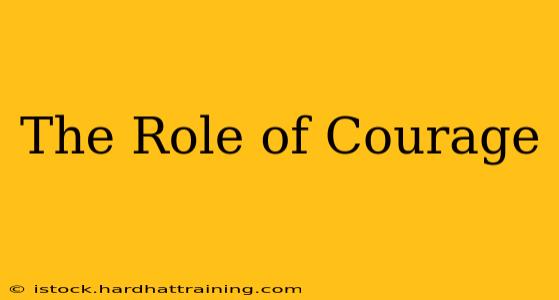Courage. The word itself evokes images of bravery, heroism, and daring feats. But courage is far more than just a dramatic act of bravery in the face of physical danger. It's a multifaceted trait that plays a crucial role in shaping our lives, influencing our choices, and ultimately determining the kind of future we create for ourselves and the world around us. This exploration delves into the multifaceted nature of courage, examining its various forms and its profound impact on individuals and society.
What is Courage, Really?
At its core, courage is the ability to confront fear and uncertainty. It's not the absence of fear – indeed, courageous individuals often experience intense fear – but rather the conscious choice to act despite that fear. This action can manifest in many ways, from small daily acts of defiance against personal anxieties to monumental acts of self-sacrifice for the greater good. It's about facing what frightens you, whether it's a physical threat, social judgment, or an internal struggle. Courage isn't a singular quality; it's a spectrum of choices, a muscle strengthened through consistent use.
What are the Different Types of Courage?
Courage isn't a monolithic concept; it exists in many forms. Understanding these nuances helps us appreciate the diverse ways in which courage manifests:
Physical Courage:
This is the most readily recognizable form of courage, involving facing physical danger or hardship. Think of firefighters rushing into burning buildings, soldiers engaging in combat, or individuals risking their lives to save others. While dramatic, this type of courage represents just one facet of the larger concept.
Moral Courage:
This involves standing up for what's right, even when it's unpopular or difficult. This might involve challenging injustice, speaking truth to power, or refusing to compromise one's values despite potential consequences. Moral courage often requires a strong sense of ethics and a willingness to endure social or professional repercussions.
Intellectual Courage:
This is the courage to embrace new ideas, challenge established beliefs, and engage in critical thinking, even if it means questioning one's own convictions. It's about embracing intellectual humility and pursuing truth, regardless of the potential for discomfort or conflict.
Emotional Courage:
This type of courage involves facing and processing difficult emotions, such as grief, fear, or vulnerability. It means allowing oneself to feel deeply, even when it’s painful, and actively working through those feelings rather than suppressing them. This requires self-awareness and a willingness to be vulnerable.
How Does Courage Benefit Individuals and Society?
The benefits of courage extend far beyond individual resilience. It's a catalyst for positive change, both on a personal and societal level:
- Personal Growth: Confronting fears fosters personal growth and resilience. Each act of courage strengthens our self-belief and expands our capacity to handle future challenges.
- Increased Self-Esteem: Overcoming obstacles, however small, builds self-esteem and confidence. This positive feedback loop encourages further acts of courage.
- Improved Mental Health: Facing difficult emotions and situations head-on can significantly improve mental well-being by reducing avoidance and anxiety.
- Social Progress: Moral courage, in particular, is essential for driving social change. Individuals who bravely challenge injustice pave the way for progress and a more equitable society.
- Innovation and Creativity: Intellectual courage fuels innovation and creativity by encouraging exploration of new ideas and challenging the status quo.
What are Some Examples of Courage in Everyday Life?
Courage isn't always about grand gestures; it often manifests in subtle yet powerful ways in everyday life. These might include:
- Speaking up for someone being bullied.
- Admitting a mistake and taking responsibility.
- Leaving a toxic relationship.
- Asking for help when you need it.
- Pursuing a challenging goal, even in the face of self-doubt.
How Can I Cultivate Courage?
Courage is not an innate trait; it's a skill that can be learned and developed over time. Here are some strategies:
- Identify and confront your fears: Acknowledge your fears instead of avoiding them. Start small and gradually increase the level of challenge.
- Practice self-compassion: Be kind to yourself, especially during times of difficulty. Recognize that setbacks are a natural part of the process.
- Build self-awareness: Understanding your own strengths and weaknesses can help you approach challenging situations with greater confidence.
- Seek support: Don't be afraid to ask for help from friends, family, or professionals.
- Celebrate your successes: Acknowledge and appreciate your accomplishments, no matter how small.
Conclusion: Embracing the Power of Courage
Courage is not merely the absence of fear, but the triumph over it. It's a multifaceted quality that empowers individuals and drives societal progress. By understanding its diverse forms and cultivating its presence in our lives, we can unlock our full potential and contribute to a more just and compassionate world. The journey towards courage is a lifelong process, but the rewards are immeasurable. Embrace the challenges, confront your fears, and discover the transformative power of courage within yourself.
